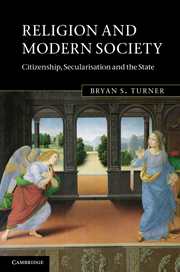Book contents
- Frontmatter
- Contents
- Acknowledgements
- Introduction: the state of the sociology of religion
- Part I Theoretical frameworks: the problem of religion in sociology
- 1 Religion, religions and the body
- 2 Émile Durkheim and the classification of religion
- 3 Max Weber and comparative religion
- 4 Talcott Parsons and the expressive revolution
- 5 Mary Douglas and Modern Primitives
- 6 Pierre Bourdieu and religious practice
- Part II Religion, state and post-secularity
- References
- Index
6 - Pierre Bourdieu and religious practice
Published online by Cambridge University Press: 05 June 2012
- Frontmatter
- Contents
- Acknowledgements
- Introduction: the state of the sociology of religion
- Part I Theoretical frameworks: the problem of religion in sociology
- 1 Religion, religions and the body
- 2 Émile Durkheim and the classification of religion
- 3 Max Weber and comparative religion
- 4 Talcott Parsons and the expressive revolution
- 5 Mary Douglas and Modern Primitives
- 6 Pierre Bourdieu and religious practice
- Part II Religion, state and post-secularity
- References
- Index
Summary
Introduction: public religions
Whereas in recent years many sociologists and philosophers have come to the conclusion that religion has to be taken seriously in debates about the nature of modern politics and the public sphere, such was not the case with many post-war social theorists. What has changed? The obvious answer is that there are various transformations of social and political life that have placed religion as an institution at the centre of modern society. Religion now appears to be closely related to identity politics, ethnicity and gender, medical technology and security issues. It has been the ideological driving force behind many social and nationalist movements such as Solidarity, ‘engaged Buddhism’ and Hindu nationalism. The earlier post-war generation of social scientists accepted the secularisation thesis that, with modernisation, religion would decline and hence there was little point investing research effort into an institution that would inevitably disappear. In Europe, there was the additional factor of Marxist social and political theory, which was in France and elsewhere an influential if not a dominant tradition in the post-war period. For critical theorists, there was no assumption that religion could continue to exercise significant ideological influence over secular modernity. Religion was simply a set of false beliefs that comforted the disinherited and legitimised the rich and powerful. Religious ideologies would disappear with the spread of secular science, urbanisation, literacy, working-class struggles, the decline of the family and the emancipation of women.
- Type
- Chapter
- Information
- Religion and Modern SocietyCitizenship, Secularisation and the State, pp. 102 - 124Publisher: Cambridge University PressPrint publication year: 2011



